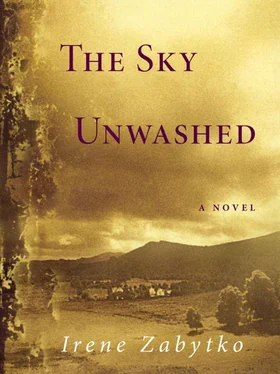“No. Maybe he’s working overtime.”
Zosia grabbed the sides of her neck with both hands as though she were about to choke herself and massaged the base of her skull. “I feel sick.”
“Of course you do, darling. You’re going to be a mother again.”
“Don’t remind me,” Zosia snapped. “That’s all I need on top of everything else.” She poured some of the boiling water into a cup and dropped in a small handful of dried spearmint leaves.
“I’ll wake the children up,” Marusia said, afraid to upset her daughter-in-law. “I’ll take them to school. Good thing it’s a school day. This way you can rest. Then we can all go to the second wedding reception at Hanna’s today.”
“I don’t care to go anywhere. I’ll stay home and wait for Yurko.”
THE DAY PASSED quietly. Tarasyk stayed home because he didn’t get enough sleep and Katia came home early from school because her teacher was ill and dismissed the class. She and Tarasyk played outside in their garden and Katia saw three helicopters in the sky. “You know what those are?” she asked the little boy. “Robots that fly like birds, and they’re looking for children to take away….” Tarasyk ran into the house and hid in the pantry for hours before anyone noticed he was missing.
That afternoon, Marusia was the only one from her family who attended the second reception at the klub . The children were too tired and Zosia was too angry. Just as well, thought Marusia, who was soon bored watching the young people dance to their awful, loud pop music.
On her way back home that evening, Marusia noticed how odd the sky looked—it was lit up in the distance the way she remembered the wartime sky, when the Germans bombed the villages. Or maybe it was what Zosia called the northern lights, the flashes of color that appeared in a freak sky. Or maybe an electrical storm in the woods somewhere. She rushed home to ask Zosia or Yurko about it, but everyone was asleep except for Bosyi, who whimpered near the door to let Marusia know that her son had not yet returned home.
THE NEXT DAY was Palm Sunday. Though the church bells did not ring as they usually did for the eight o’clock Mass, the only service of the day, several old people were in attendance. No one expected Hanna and her new husband to appear, because no one expected any of the younger people to show up on holy days, especially when they fell on Sundays. And since Marusia knew that the teachers would ask which students had attended church, it was a good idea not to include her grandchildren in the service because they would only get into trouble, and then Zosia would growl at her for being “so stubbornly primitive.”
Marusia stood near the back of the church with Slavka Lazorska and the others. They waited with armfuls of pussy willows, as was the custom. Palms were impossible to get. Father Andrei did not appear to open the altar doors of the iconostasis. He was late, which wasn’t surprising since he was probably working overtime at the plant. But when it got to be almost nine o’clock, the women began to whisper among themselves. Paraskevia was especially upset. Father Andrei, her son, had not returned home after his shift ended on Saturday morning. He would not miss a Sunday service unless he was arrested or ill, and yesterday he had missed performing two afternoon wedding ceremonies. She moved to the back of the church, apart from the rest, where she knelt very low on the ground, bowed her head and prayed deeply, her eyes closed.
“I don’t think he’s coming,” said Evdokia. She looked at the watch pinned to her cable-knit sweater.
“We should start by ourselves,” said Maia Medvid’. She nudged her husband, Stepan, who hesitantly walked up to the altar, pinched his thumb and the first two fingers together of his right hand, and crossed himself in the Eastern Orthodox manner. He opened the golden doors of the iconostasis. Another elder lit the thin orange candles that stood in front of the icons.
“Hey, Yulia, maybe you should sing,” Evdokia said to the tall woman leaning against one of the wooden beams in the center of the church. Long ago, during Stalin’s regime, Yulia Pan’kovych had been about to begin training as a mezzo-soprano with the Kyiv Opera when she was arrested and exiled to Siberia for refusing to denounce her music professor, who was accused of teaching anti-Soviet songs. Yulia was well into her seventies, but despite her humped back, her voice was still mellow and resonant, and it reverberated as she sang the somber Lenten hymns. The others in the small gathering of old women and their husbands joined in, except for Paraskevia, who was still on her knees swaying and mumbling the prayer of repentance and beating her slightly sunken chest with her yellow fist.
When they finished the songs, the worshippers lingered together a little longer, praying silently for hope and courage, for loved ones, living and dead, and for the Union—such as it was. Some of them stood and prayed, as there were no benches. Others knelt, kissing the floor. They rose and, at the holy water font near the door, blessed the pussy willows. Then the candles were extinguished and the altar doors closed. It was time for everyone to leave and the church to be locked.
Paraskevia was the last to go. Marusia waited for the old woman to finish her prayers before tapping her shoulder. Tears flooded the older woman’s little peanut eyes, and Marusia helped her stand up on her feet.
“God grant you peace,” Marusia said.
Paraskevia shook her head and wiped her eyes with her sleeve. They blessed themselves with holy water and walked arm in arm outside into the humid day.
Paraskevia couldn’t help crying. “The end of the world. Taste the air. It’s not the same. And my son is gone.”
Marusia flicked her tongue out for a second. The air did taste different, like steel. She watched Evdokia do the same.
“ Feh! ” Evdokia grimaced, then rushed to Lazorska. “Hey, Pani Dokhtor , my eyes are itchy and watering.” She saw that Lazorksa’s eyes were just as red.
“Something in the air. Maybe pollen. It’s spring, after all,” the healer said.
“And my old man also gets such horrible hay fever…. What cure do you have for it?”
Before Lazorska could answer, Paraskevia released herself from Marusia’s arm and yelled out to the group, “ Trahedia! Tragedy! Go home and hug your grandchildren! Save yourselves from this crooked generation because it’s the end of the world!” She turned away and kept shouting and beating her chest with her fist while scuttling down the path leading back to her lonely house.
“She’s getting crazier than ever,” said Evdokia.
From her oilcloth shopping bag, Slavka Lazorska fished out a dried sunflower head that was still rich with black seeds. She pulled some out of their husks and passed them to the other women. “Paraskevia is a wise woman. She knows things I never heard of.” She spat the seed shells out. “But admit it, here we are in God’s own backyard, and we are all suffering from some devil’s curse in the air.”
“Maybe she’s just worried about her son,” Maia put in, and Marusia wondered if Yurko was all right. He would surely be home by now.
“I suppose the priest was too tired to come today,” another woman said.
“Well, when he came to Hanna’s reception, he danced his curly head off,” Evdokia said. “Everyone saw….” She was looking around for her own husband, who was smoking a forbidden cigarette with some of the men but stopped when he saw her frowning at him. He angrily took out his empty pipe and sucked on it.
Evdokia ran after him with a pussy willow. “I’m not hitting you, the pussy willow is—Easter will be here a week from today!”
Читать дальше











